-
Product Name
PFKFB3-Specific antibody
- Documents
-
Description
PFKFB3-Specific Rabbit Polyclonal antibody. Positive IP detected in HEK-293 cells. Positive WB detected in mouse thymus tissue, A431 cells, A549, HEK-293 cells, HeLa cells, Jurkat cells, mouse heart tissue, mouse spleen tissue. Positive IHC detected in human liver cancer tissue, human kidney tissue, human liver tissue. Positive IF detected in HepG2 cells. Observed molecular weight by Western-blot: 58 kDa
-
Tested applications
ELISA, WB, IHC, IF, IP
-
Species reactivity
Human,Mouse,Rat; other species not tested.
-
Alternative names
6PF 2 K/Fru 2 antibody; 6 P2ase 3 antibody; FLJ37326 antibody; IPFK2 antibody; PFK/FBPase 3 antibody; PFK2 antibody; PFKFB3 antibody
-
Isotype
Rabbit IgG
-
Preparation
This antibody was obtained by immunization of PFKFB3-Specific recombinant protein (Accession Number: NM_004566). Purification method: Antigen affinity purified.
-
Clonality
Polyclonal
-
Formulation
PBS with 0.02% sodium azide and 50% glycerol pH 7.3.
-
Storage instructions
Store at -20℃. DO NOT ALIQUOT
-
Applications
Recommended Dilution:
WB: 1:500-1:5000
IP: 1:500-1:5000
IHC: 1:20-1:200
IF: 1:20-1:200
-
Validations
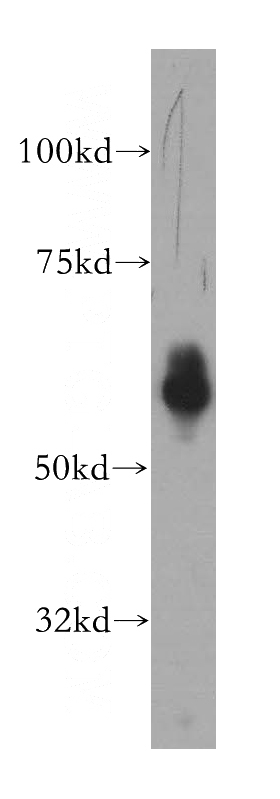
mouse thymus tissue were subjected to SDS PAGE followed by western blot with Catalog No:113770(PFKFB3 antibody) at dilution of 1:600
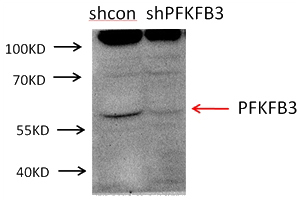
A549 cells were subjected to SDS PAGE followed by western blot with Catalog No:113770(PFKFB3 antibody) at dilution of 1:1000. (Data provided by Angran Biotech (www.miRNAlab.com)).
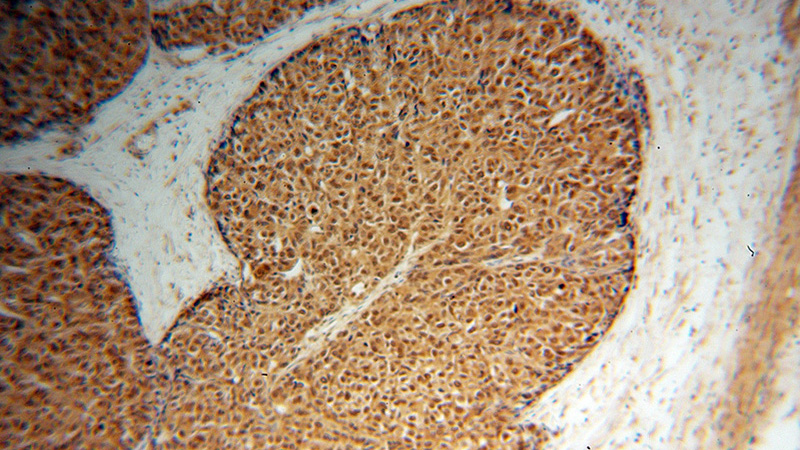
Immunohistochemical of paraffin-embedded human liver cancer using Catalog No:113770(PFKFB3 antibody) at dilution of 1:100 (under 10x lens)
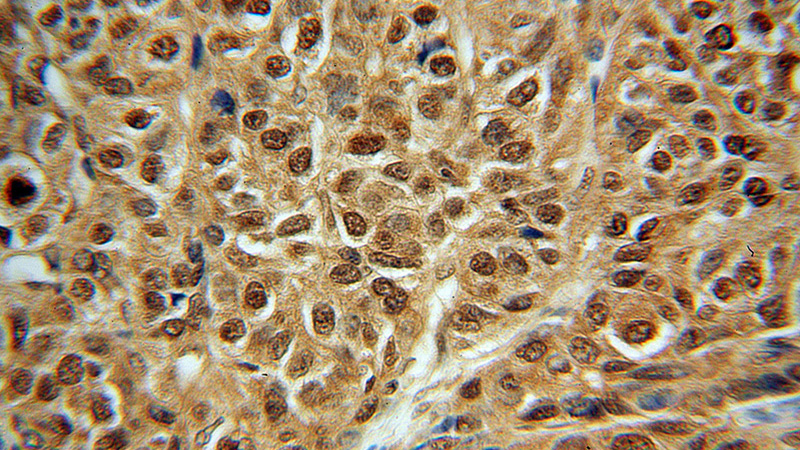
Immunohistochemical of paraffin-embedded human liver cancer using Catalog No:113770(PFKFB3 antibody) at dilution of 1:100 (under 40x lens)
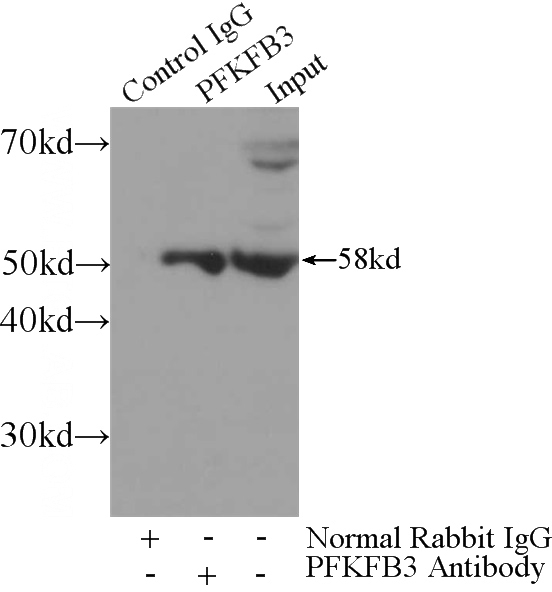
IP Result of anti-PFKFB3 (IP:Catalog No:113770, 3ug; Detection:Catalog No:113770 1:1000) with HEK-293 cells lysate 4000ug.
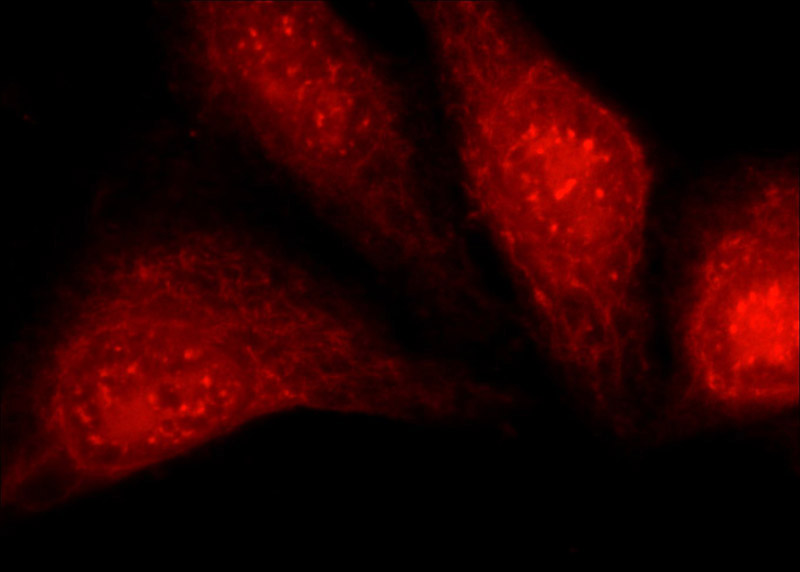
Immunofluorescent analysis of HepG2 cells using Catalog No:113770(PFKFB3 Antibody) at dilution of 1:50 and Rhodamine-Goat anti-Rabbit IgG
-
Background
PFKFB3, also named as NY-REN-56 and iPFK-2, plays a role in glucose metabolism. It synthesis and degradation of fructose 2,6-bisphosphate. Endogenously generated adenosine cooperates with bacterial components to increase PFKFB3 isozyme activity, resulting in greater fructose 2,6-bisphosphate accumulation. PFKFB3 is required for increased growth, metabolic activity and is regulated through active JAK2 and STAT5. This antibody is specific to PFKFB3.
-
References
- Yalcin A, Clem BF, Imbert-Fernandez Y. 6-Phosphofructo-2-kinase (PFKFB3) promotes cell cycle progression and suppresses apoptosis via Cdk1-mediated phosphorylation of p27. Cell death & disease. 5:e1337. 2014.
- Xu Y, An X, Guo X. Endothelial PFKFB3 plays a critical role in angiogenesis. Arteriosclerosis, thrombosis, and vascular biology. 34(6):1231-9. 2014.
- Tan Z, Xie N, Banerjee S. The monocarboxylate transporter 4 is required for glycolytic reprogramming and inflammatory response in macrophages. The Journal of biological chemistry. 290(1):46-55. 2015.
- Du JY, Wang LF, Wang Q, Yu LD. miR-26b inhibits proliferation, migration, invasion and apoptosis induction via the downregulation of 6-phosphofructo-2-kinase/fructose-2,6-bisphosphatase-3 driven glycolysis in osteosarcoma cells. Oncology reports. 33(4):1890-8. 2015.
- Xie N, Tan Z, Banerjee S. Glycolytic Reprogramming in Myofibroblast Differentiation and Lung Fibrosis. American journal of respiratory and critical care medicine. 192(12):1462-74. 2015.
- Kalucka J, Missiaen R, Georgiadou M. Metabolic control of the cell cycle. Cell cycle (Georgetown, Tex.). 14(21):3379-88. 2015.
- Telang S, Clem BF, Klarer AC. Small molecule inhibition of 6-phosphofructo-2-kinase suppresses t cell activation. Journal of translational medicine. 10:95. 2012.
- De Bock K, Georgiadou M, Schoors S. Role of PFKFB3-driven glycolysis in vessel sprouting. Cell. 154(3):651-63. 2013.
Related Products / Services
Please note: All products are "FOR RESEARCH USE ONLY AND ARE NOT INTENDED FOR DIAGNOSTIC OR THERAPEUTIC USE"
